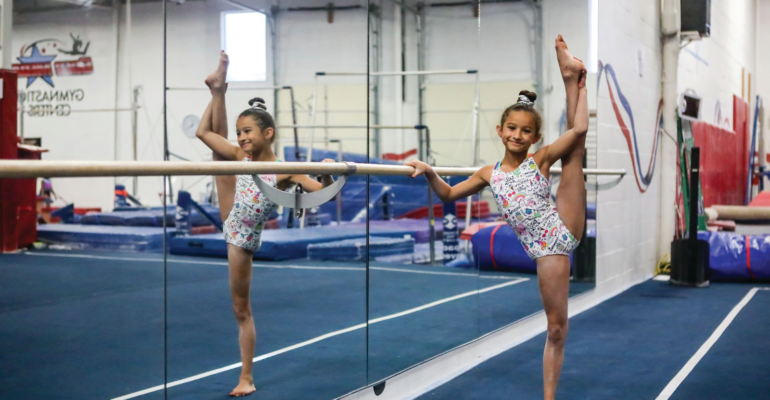As a parent deeply involved in the gymnastics community, you already appreciate the blend of strength, flexibility, and mental resilience required in this demanding sport. This guide is crafted to deepen your understanding and enhance your ability to support your young gymnast through their competitive journey.
Imagine watching your child perform a perfect gymnastics routine. As you swell with pride, you also feel the heavy responsibility you carry. Your involvement is crucial, from managing their busy schedules to providing emotional support.
Is your gymnast ready to elevate their performance? Explore the exceptional coaching and facilities at Gold Medal Gymnastics, we propel athletes to their peak potential!
On This Page
The Rigors of Competitive Gymnastics
Competitive gymnastics is not for the faint of heart. It requires dedication, discipline, and countless hours of training. As a parent, it’s essential to understand what your child is committing to:
- Time commitment: Training upwards of 20-30 hours weekly is typical for elite gymnasts, especially during peak competition season.
- Physical demands: This sport challenges the body intensely, necessitating peak physical condition to perform and endure.
- Mental resilience: Overcoming psychological barriers and handling pressure are crucial skills your gymnast needs to cultivate.
- Academic balance: Juggling academics and intensive training demands superb organizational skills.
Strategies for Emotional Support
Your role in providing emotional support is critical. Here’s how you can be a solid backbone for your gymnast:
- Be a good listener: Allow your child to express their feelings about training, competitions, and challenges they face.
- Offer encouragement: Celebrate successes and provide comfort during setbacks.
- Manage expectations: Help your child set realistic goals and understand that progress takes time.
- Foster a positive mindset: Encourage a growth mindset that focuses on effort and improvement rather than just results.
Logistical Support
Beyond emotional support, the logistical aspects you manage are crucial:
- Transportation: Ensure your child gets to and from practices and competitions on time.
- Nutrition: Provide a balanced diet that meets the energy demands of intense training.
- Equipment: Invest in proper gymnastics attire and any necessary equipment.
- Competition planning: Organize travel, accommodations, and schedules for out-of-town meets. For example, the annual Gold Medal Invitational held in Long Island, New York, is a prestigious event that many elite gymnasts aim to participate in. Planning for such events well in advance can help reduce stress and ensure your gymnast is fully prepared.
Balancing School and Gymnastics
Education remains a priority, and balancing it with gymnastics is essential for your child’s development:
- School communication: Keep educators informed about your child’s gymnastics schedule.
- Study plans: Foster effective study habits to manage both school and training.
- Exploring educational options: Consider homeschooling or online schooling to better fit training schedules. The NCAA provides resources on balancing academics and athletics for student-athletes.
- Stressing educational importance: Remind your child of the significance of their education.
Building a Support Network
You’re not alone in this journey. A robust support network is invaluable:
Remember, you’re not alone in this journey. Building a strong support network can be incredibly beneficial:
- Connect with other gymnastics parents: Share experiences, advice, and support.
- Develop a good relationship with coaches: Open communication with your child’s coaches is essential.
- Seek professional help when needed: Don’t hesitate to consult sports psychologists or nutritionists if necessary.
- Utilize comprehensive support services: Many top-tier gymnastics centers offer a range of services to support elite athletes. For example, Gold Medal Gymnastics Center provides athlete marketing, choreography, physical therapy, nutrition counseling, and mental conditioning as part of their team services. These resources can be invaluable in supporting your gymnast’s overall development and performance.
Financial Planning
Competitive gymnastics can be expensive. Here are some tips for managing the financial aspect:
- Budget for expenses: Plan for competition fees, travel costs, equipment, and training fees.
- Look for sponsorships or scholarships: Research opportunities for financial assistance.
- Fundraising: Organize or participate in fundraising events to help offset costs.
Health and Safety
Ensuring your gymnast’s health and safety should always be a top priority:
- Regular check-ups: Schedule regular medical and physical therapy appointments.
- Proper nutrition: Work with a nutritionist to develop a diet plan that supports your athlete’s needs. USA Gymnastics offers health and wellness resources for gymnasts and coaches.
- Rest and recovery: Ensure your child gets adequate sleep and time for physical recovery.
- Address injuries promptly: Don’t ignore signs of injury or overtraining.
Maintaining Perspective
While supporting your elite gymnast, it’s important to maintain perspective:
- Remember it’s their journey: Allow your child to take ownership of their gymnastics career.
- Encourage a well-rounded life: Support interests and friendships outside of gymnastics.
- Focus on personal growth: Emphasize the life skills and character development that come from the sport.
- Be prepared for transitions: Understand that gymnastics careers are often short, and help your child prepare for life after competitive gymnastics.
- Celebrate achievements at all levels: Recognize that success in gymnastics can take many forms. For inspiration, check out Gold Medal Gymnastics Center’s Hall of Fame and Scholarships page, which showcases the diverse accomplishments of their competitive athletes, from national champions to collegiate scholarship recipients.
Frequently Asked Questions
Q: At what age should my child start competitive gymnastics?
A: While children can start recreational gymnastics as young as 2 or 3, competitive gymnastics typically begins around 6-8 years old. However, the right age varies for each child and depends on their physical and emotional readiness.
Q: How can I tell if my child is truly passionate about gymnastics?
A: Look for signs of intrinsic motivation. Does your child eagerly anticipate practice? Do they talk about gymnastics outside of the gym? Are they willing to put in extra work? These can be indicators of genuine passion.
Q: What should I do if my child wants to quit gymnastics?
A: First, have an open and honest conversation to understand their reasons. If it’s due to temporary frustration, encourage them to persevere. However, if they’ve lost interest or it’s affecting their well-being, it may be time to consider other options.
Q: How can I help my child cope with competition anxiety?
A: Teach relaxation techniques like deep breathing or visualization. Encourage a focus on personal improvement rather than winning. The American Psychological Association offers tips for managing performance anxiety that can be helpful for gymnasts. Consider working with a sports psychologist if anxiety is severe.
Q: Is it normal for my child to experience burnout?
A: Burnout can occur in high-level athletes. Signs include loss of enthusiasm, chronic fatigue, and decreased performance. If you notice these signs, discuss reducing training intensity or taking a short break with your child’s coach.
Q: How much should I be involved in my child’s training?
A: While it’s important to be supportive, avoid micromanaging. Trust the coaches and allow your child to develop independence. Your primary role is to provide emotional support and handle logistics.
Supporting an elite gymnast is a significant commitment, but it can also be an incredibly rewarding experience. By providing emotional support, managing logistics, and maintaining a balanced perspective, you can help your child thrive in the challenging world of competitive gymnastics.
Remember, every gymnast’s journey is unique. Stay flexible, keep communication open, and always prioritize your child’s well-being above all else. With the right support, your young athlete can reach great heights – both on and off the mat.
Ready to give your gymnast the best possible training environment? Visit Gold Medal Gymnastics today and take the first step towards Olympic dreams!


